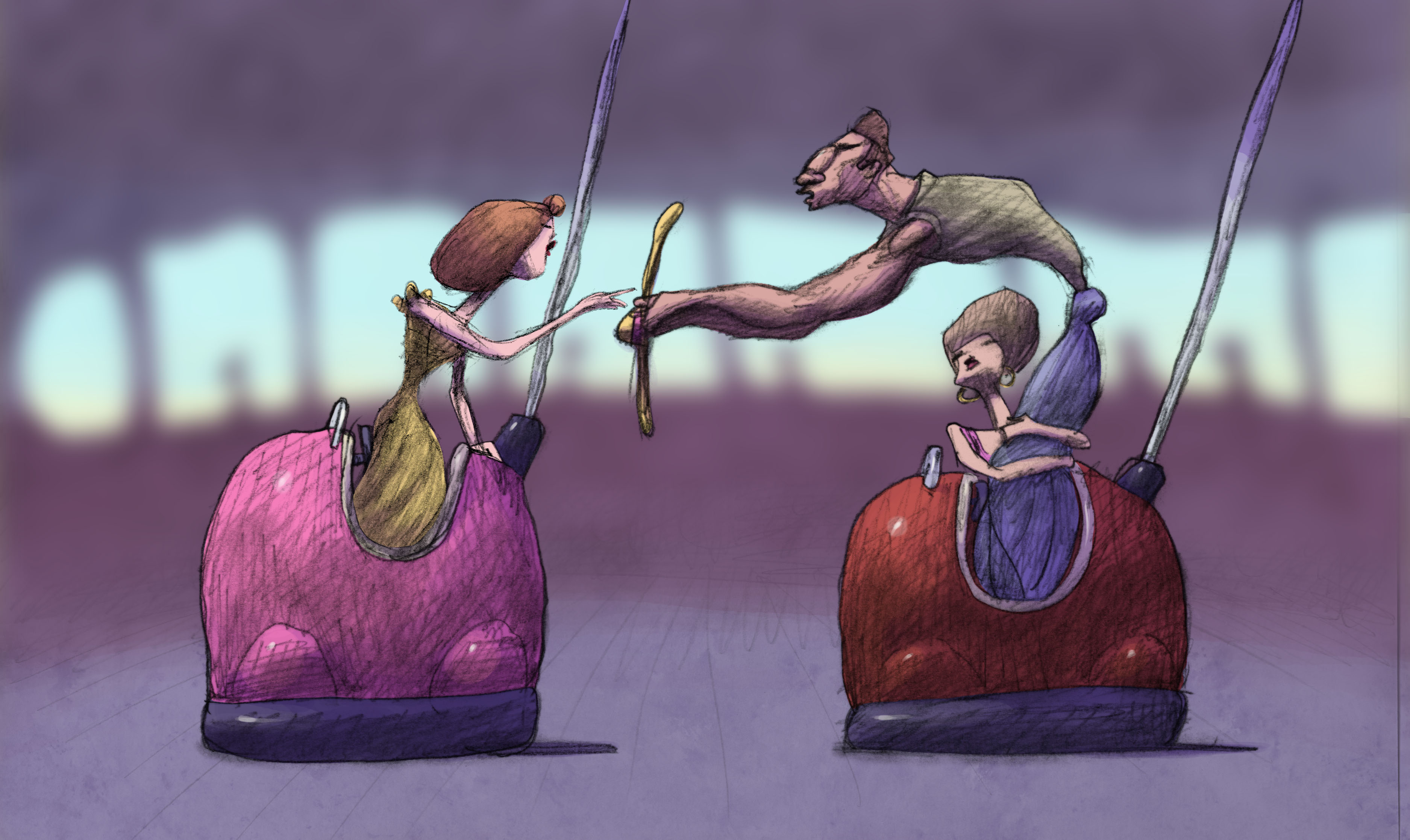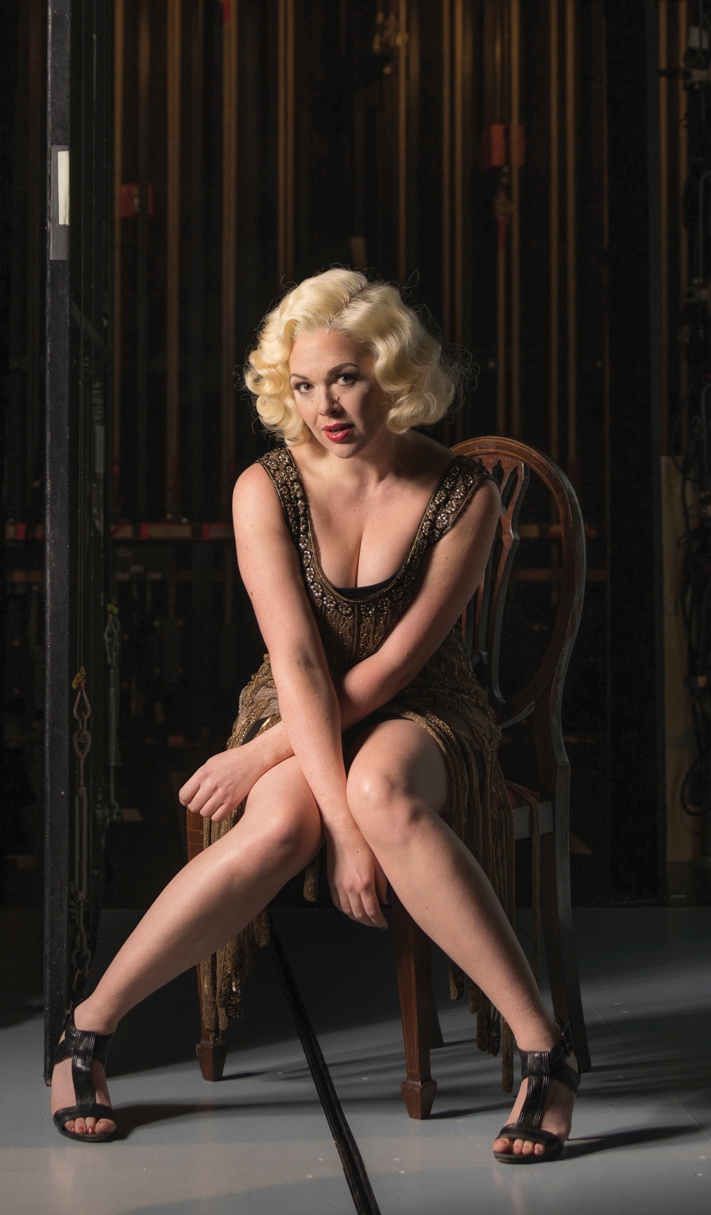Wednesday, April 15
Bill Plympton
Appearing at tonight’s screening of Cheatin’, the veteran animator is famous for hand-drawing every frame of his comic and generally satirical movies (Your Face, Idiots & Angels, Hair High, etc.). For this new James M. Cain-inspired tale of adultery, attempted murder, and regret, he actually employed other artists via a Kickstarter campaign—showing that it’s never too late to embrace change. His usual slapstick, sexual innuendo, and physical transmogrifications are all in evidence, but there’s also a satisfying story arc that’s rendered without benefit of dialogue. (Cheatin’ instead uses opera snippets, sound effects, and a cabaret-style underscore by Nicole Renaud.) Bookish sex-bomb Ella and muscle-man Jake meet cute on the bumper-car ride at a carnival; their marriage carries an electric spark until a jealous store clerk frames Ella in a compromising photo that misleads grief-stricken Jake into serial afternoon affairs at the EZ Motel.
Instead of resolving things in the electric chair, Plympton introduces a magical, sci-fi twist. Cheatin’ is better and more romantic than his earlier work, with a particular flair for motion shots, sudden shifts in perspective, and elastic physical gags. In a bit I loved, a suburban temptress tries to lure Jake across her backyard fence with fluttering laundry set loose in the wind. Her bed sheets fly across the blue sky in an endless pattern of pure white rectangles that also suggest unsullied writing paper. At that moment, Jake’s newlywed imagination hasn’t yet been inked with doubt. (Through Tues.) Northwest Film Forum, 1515 12th Ave., 267-5380, nwfilmforum.org. $6–$11. 8:30 p.m.
BRIAN MILLER
T.C. Boyle
In a New York Times By the Book column last month, Boyle was asked, “If you were hosting a dinner party, which three authors would you invite?” He answered, “I would wait till I had a severe case of laryngitis and invite one only: Ernest Hemingway.” Fitting, considering that Big Papa defined the art of fiction as something that gave the reader emotion, excitement, and, above all else, action. Few writers today are better are penning gripping, tense, and sharp-edged action than the veteran California novelist. The Harder They Come (Ecco, $35) is his 15th novel, and what a blast of a read it is. Again, Boyle turns to the thematic ambition that has fueled much of his writing, whether in The Tortilla Curtain or When the Killing’s Done: trying to “dissect America’s love affair with violence,” as Spokane novelist Jess Walter put it so well. The Harder They Come, one of Boyle’s best creations, is a blood-raising tale that begins at a breathtaking gallop with the story of Sten Stensen, a 70-year-old former teacher and ex-Marine who, on a Central America cruise with his wife, Carolee, kills with his bare hands an armed robber holding captive a busload of tourists. Sorrento Hotel, 900 Madison St., 888-377-4510, townhallseattle.org. $5. 7:30 p.m.
ELLIS CONKLIN
Bruce Barcott
After our 2012 vote for Initiative 502, former SW writer Barcott spent two years following the sudden gold rush toward legal pot sales, from Washington state to Colorado and beyond. His journey, related in Weed the People (Time Books, $30), brought him into contact with slick venture capitalists, dubious medical-pot merchants, naive would-be businessmen, seriously ill people for whom THC is necessary medicine, Seattle City Attorney Pete Holmes, I-502 author Alison Holcomb, and of course Tommy Chong. Barcott is polite with the latter figure, visiting Tacoma to explore a licensing deal, but his disdain for the old hippie-countercultural cult of cannabis is clear. Though no memoir (leave that to his wife, SW alumnus Claire Dederer, of Poser), Weed the People is very much a personal odyssey that begins with Barcott’s avowed “personal loathing of marijuana.” It turns out the author toked a bit at the UW, became disgusted with his loss of focus, then applied himself rigorously to a successful writing career (which includes The Measure of a Mountain and The Last Flight of the Scarlet Macaw).
In engaging, well-reported vignettes, Barcott undergoes with the reader a kind of parallel self-education. Most of those incarcerated in the past for pot, he learns, were poor and people of color. Yet he also finds that those now profiting from the weed bonanza are, like him, mostly white and privileged. (That disconnect is amusingly brought home at a Bainbridge citizens’ meeting where everyone smokes pot and wants a store on the island—just not in their backyard. The stigma of illegality and those kind of people persists.) By the end of his persuasive and surprisingly inspirational account, Barcott is again an occasional smoker who can separate his bourgeois habit from the unwashed hordes at Hempfest. Elliott Bay Book Co., 1521 10th Ave., 624-6600, elliottbaybook.com. Free. (Also: Eagle Harbor Book Co., 7:30 pm. Thurs.; Town Hall, $5, 7:30 p.m. Tues.)
BRIAN MILLER
Thursday, April 16
Lyon Opera Ballet
This company has always pushed the edge of what might qualify as “ballet,” performing works by some of the most groundbreaking postmodern choreographers. Through Saturday, the repertory they’re bringing includes William Forsythe’s seminal Steptext and Sarabande by Benjamin Millepied, who went from dancing with New York City Ballet to running the Paris Opera Ballet via Hollywood, choreographing for Darren Aronofsky’s Black Swan (and marrying its star, Natalie Portman). Meany Hall, UW campus, 543-4880, uwworldseries.org. $47–$52. 8 p.m.
SANDRA KURTZ
Friday, April 17
Cornish Dance Theater
Kitty Daniels, chair of the Cornish dance department, has continually set big performance challenges for her students. Her last trick before retiring this spring is to present them in excerpts from Crystal Pite’s Dark Matters, a stunningly kinetic work. Pite’s own company knocked local audiences flat with the dance in 2011. It should be fascinating to see this group of young dancers stepping up. (Through Sat.) Broadway Performance Hall, 1625 Broadway, cornish.edu. $5–$12. 8 p.m.
SANDRA KURTZ
Sunday, April 19
Jennifer Teege
“Is there such a thing as fate?” Teege asks in her first chapter of My Grandfather Would Have Shot Me (The Experiment, $25). The degree to which unlikely circumstances play in her nearly incredible memoir almost makes it sound like a work of fiction. One day, while the German-Nigerian author was browsing in a Hamburg library, she stumbled upon I Have to Love My Father, Don’t I?: The Life Story of Monika Goeth, Daughter of the Concentration Camp Commandant From Schindler’s List. Goeth was Teege’s estranged mother, who gave her up for adoption at age 7; 30 years later she abruptly learned she was the granddaughter of Amon Goeth, the sadistic Nazi SS officer played by Ralph Fiennes in Schindler’s List. Teege’s discovery first became a sensational story in the pages of Stern, then a bestseller in Germany (with journalist Nikola Sellmair as her co-author). In her book, Teege follows her grandfather’s lethal footsteps to Krakow, guiltily revisits Israel (where she studied Hebrew during her 20s), and sinks into a deep depression. Never mind fate; her message is an important one—that we have the power to decide who we are. Elliott Bay Book Co. Free. 3 p.m.
DIANA M. LE







